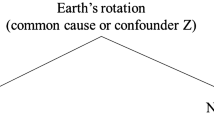Abstract
Behavior analysts take the position that prediction and control constitute the goals of science. This assumption has resulted in descriptive operations being overlooked and misunderstood. Among the most serious of these misunderstandings is the confusion of events with descriptive constructions. Confusion is likely when the events described present problems of observation, when they appear to resemble our descriptions of them, and when they are taken to be synonymous with our reactions to them. Examples of confusing events with their descriptions are examined in the context of the radical behavioral interpretation of causality, along with their implications for a scientific understanding. An alternative interpretation of causal knowledge is suggested.
Similar content being viewed by others
References
ADAMS, M. A. (1994). Inherited behavior: Interbehavioral and radical behavioral interpretations. The Interbehaviorist, 22, 12–15.
BAUM, W. M. (1994). Understanding behaviorism: Science, behavior and culture. New York: Harper Collins College Publishers.
BAUM, W. M. (1995). Rules, culture and fitness. The Behavior Analyst, 18, 1–22.
CAPRA, F. (1976). The tao of physics. New York: Bantam Books.
CATANIA, A. C. (1992). Learning (3rd ed.). New Jersey: Prentice-Hall, Inc.
FETTERMAN, J. G., & KILLEEN, P. R. (1990). A componential analysis of pacemaker timing systems. Journal of Experimental Psychology: Human Perception and Performance, 16, 766–780.
HAYES, L. J. (1991). Substitution and reference. In L. J. Hayes & P. N. Chase (Eds.), Dialogues on verbal behavior (pp. 3–18). Reno, NV: Context Press.
HAYES, L. J. (1992). The psychological present. The Behavior Analyst, 15, 139–146.
HAYES, L. J. (1993). Reality and truth. In S. C. Hayes, L. J. Hayes, H. W. Reese, & T. Sarbin (Eds.), Varieties of scientific contextualism (pp. 33–41). Reno, NV: Context Press.
HAYES, L. J. (1994). Psicologica interconductual: Basica y aplicada. In L. J. Hayes, E. Ribes, & E. Lopez Valdez (Eds.), Psicologica interconductual: Contribuciones en honor a J. R. Kantor. Guadalajara, Jal., Mexico: Universidade Guadalajara Direccion de Publicaciones.
HAYES, L. J. (1996). Space and time in psychological perspective. In L. J. Hayes & P. M. Ghezzi (Eds.), Investigations in Behavioral Behavioral Epistemology. Reno, NV: Context Press.
HAYES, S. C, HAYES, L. J., & REESE, H. W. (1988). Finding the philosophic core: A review of S. C. Pepper’s “World Hypotheses.” Journal of the Experimental Analysis of Behavior, 50, 97–111.
KANTOR, J. R. (1938). The nature of psychology as a natural science. Acta Psychologica, 4, 1–61.
KANTOR, J. R. (1950). Psychology and logic, V.ll. Chicago: The Principia Press.
KANTOR, J. R. (1953). The logic of modern science. Chicago: The Principia Press.
KANTOR, J. R. (1959). Interbehavioral psychology (2nd ed.) Bloomington, IN: The Principia Press.
KANTOR, J. R. (1969). Scientific psychology and specious philosophy. The Psychological Record, 19, 15–27.
KANTOR, J. R. (1970). The analysis of the experimental analysis of behavior. Journal of the Experimental Analysis of Behavior, 13, 101–108.
KANTOR, J. R. (1971). The aim and progress of psychology and other sciences. Chicago: The Principia Press.
KANTOR, J. R. (1977). Psychological linguistics. Chicago: The Principia Press.
LYCAN, W. G. (1988). Skinner and the mind-body problem. In A. C. Catania & S. Harnad (Eds.), The selection of behavior (pp. 325–326). New York: Cambridge University.
MICHAEL, J. L. (1993). Concepts and principles of behavior analysis. Kalamazoo, Ml: Society for the Advancement of Behavior Analysis.
PARROTT, L. J. (1984). Listening and understanding. The Behavior Analyst, 7, 29–39.
RIBES, E. (1984). The relation between interbehaviorism and the experimental analysis of behavior: The search for a paradigm. The Psychological Record, 34, 567–573.
RIBES, E. (1986). Is operant conditioning sufficient to cope with human behavior? In P. N. Chase & L. J. Parrott (Eds.), Psychological aspects of language. Springfield, IL: Charles C. Thomas.
SEGAL, E. F. (1973). Induction and the provenance of operants. In R. M. Gilbert & J. R. Millenson (Eds.), Reinforcement: Behavioral analysis. New York: Academic Press.
SELIGMAN, M. E. P. (1970). On the generality of the laws of learning. Psychological Review, 406–418.
SKINNER, B. F. (1953). Science and human behavior. New York: MacMillan.
SKINNER, B. F (1957). Verbal behavior. New York: Appleton-Century-Crofts.
SKINNER, B. F (1971). Beyond freedom and dignity. New York: Knopf.
SKINNER, B. F (1974). About behaviorism. New York: Knopf.
SKINNER, B. F (1981). Selection by consequences. Science, 213, 501–504.
ZIMMERMAN, D. (1979). Quantum theory and interbehavioral psychology. The Psychological Record, 29, 473–485.
Author information
Authors and Affiliations
Rights and permissions
About this article
Cite this article
Hayes, L.J., Adams, M.A. & Dixon, M.R. Causal constructs and conceptual confusions. Psychol Rec 47, 97–112 (1997). https://doi.org/10.1007/BF03395214
Published:
Issue Date:
DOI: https://doi.org/10.1007/BF03395214




